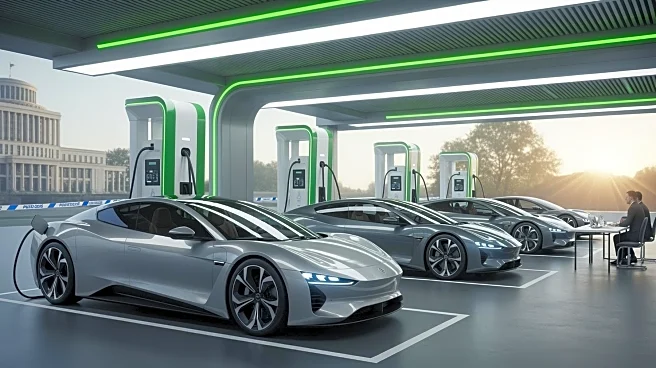What's Happening?
Oshkosh Corporation, a longstanding vehicle manufacturer in the United States, is expanding its production of zero-emission vehicles. Known for its diverse range of vehicles, including fire trucks, military
vehicles, and the Next Generation Delivery Vehicle (NGDV) for the United States Postal Service, Oshkosh is now focusing on integrating fully electric and autonomous technologies into its offerings. The company recently showcased its electric vehicles at its headquarters in Oshkosh, Wisconsin, highlighting innovations such as autonomous trash collection vehicles and electric airport ground support equipment. These developments are part of Oshkosh's strategy to enhance operational efficiencies and reduce emissions across various industries.
Why It's Important?
The shift towards zero-emission vehicles by Oshkosh Corporation is significant for several reasons. It aligns with broader environmental goals to reduce carbon emissions and combat climate change. By offering electric configurations for traditionally diesel-powered vehicles, Oshkosh is contributing to cleaner air and reduced reliance on fossil fuels. This transition also positions the company as a leader in sustainable vehicle manufacturing, potentially influencing other manufacturers to adopt similar practices. The integration of autonomous technology further enhances safety and efficiency, particularly in high-stakes environments like airports and urban settings. This move could lead to increased demand for Oshkosh's vehicles, benefiting the company's growth and the U.S. economy.
What's Next?
Oshkosh Corporation is expected to continue its focus on innovation and sustainability. The company plans to expand its electric vehicle offerings and further develop autonomous technologies. As demand for zero-emission vehicles grows, Oshkosh may explore new markets and partnerships to enhance its product lineup. Stakeholders, including government agencies and private companies, are likely to monitor Oshkosh's progress closely, as their vehicles play a crucial role in infrastructure and logistics. Future developments may include collaborations with technology firms to advance autonomous capabilities and further reduce the environmental impact of their vehicles.
Beyond the Headlines
The broader implications of Oshkosh's advancements in zero-emission vehicles extend to ethical and cultural dimensions. The company's commitment to sustainability reflects a growing societal emphasis on environmental responsibility. This shift may influence public perception and consumer behavior, encouraging more individuals and organizations to prioritize eco-friendly solutions. Additionally, the integration of autonomous technology raises questions about the future of labor in industries reliant on manual vehicle operation. As automation becomes more prevalent, there may be a need for workforce retraining and adaptation to new roles within the evolving transportation sector.










